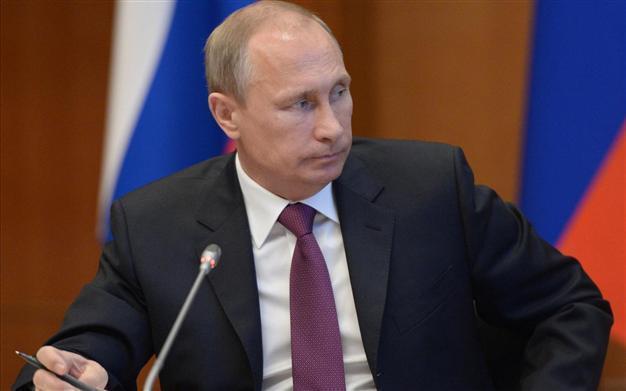Putin urges Europeans to have 'common sense' over sanctions threat
MOSCOW - Agence France-Presse

Russian President Vladimir Putin listens during a meeting on development of the Russian Far East issues in Yakutsk, Russia, Spet. 1 AP Photo
Russian President Vladimir Putin urged the EU on Sept. 1 to show "common sense" and not to engage in mutually destructive sanctions, in his first reaction to the threat of additional punitive measures over Ukraine."I hope that common sense will prevail, ... that we will work together normally and that we and our partners will not cause harm by poking at one another," Putin was quoted as saying by Russian news agencies during a visit to the eastern Siberian city of Yakutsk.
The remarks came a day after European Union leaders gave Russia a week to reverse course in Ukraine or face a new round of sanctions.
Fears are growing that the confrontation could engulf the whole continent after Russia allegedly sent troops to back a new offensive by pro-Kremlin rebels in southeastern Ukraine.
Russian officials have said previously that they were preparing countermeasures in case of new Western sanctions, after having last month banned most EU and U.S. food imports.
But Foreign Minister Sergei Lavrov earlier Sept. 1 said that Russia would not "slam the door shut" on Western trade nor exit from the World Trade Organisation.
"We will, above all, proceed from our own interests, defend our economy, defend our social system, defend our businesses..." Lavrov told Moscow university students.
Sanctions threats and reports of Russian tanks being involved in fighting outside of Lugansk sent the ruble to a new record low of 37.4610 in afternoon trading.
It also sank to a five-month low of 49.2347 to the euro. "The Russian FX ... market remains focused on geopolitical risks," said analysts at VTB Capital.
"Clearly, that kind of environment spoils even the near-term outlook," they added. Russian stocks were also lower in early afternoon trading, with the ruble-denominated MICEX index slipping 0.09 percent and the dollar-denominated RTS slumping 1.06 percent after sharper falls on Aug. 29.
Previous sanctions, which targeted Kremlin-linked figures and limited access of state-controlled banks and companies to Western financial markets, have not had a severe impact nor swayed Russian policy.
The threat of sanctions, however, sent sentiment plunging and sparked a surge in capital flight that has starved the Russian economy of the investment it needs and brought it to the brink of recession.
This time the Russian market is concerned over the possibility that banks could be excluded from the SWIFT system for international financial transactions as part of the next EU sanctions, which officials are to elaborate during the course of this week.
Banning Iran from the system in 2012 damaged the country's economy but is widely seen as having helped bring the Islamic Republic back to the negotiating table regarding its contested nuclear programme.
"If that does in fact take place, of course a significant part of Russian banks' foreign transactions will simply be paralysed," former economy minister Andrei Nechayev said on Moscow Echo radio over the weekend.
But the financial commentator for Russia24 TV warned that the measure is a double-edged sword.
"If you take into account that trade in oil and gas is done in dollars then being cut off from SWIFT then there will immediately be serious problems in making payments for those strategic goods, which are also important for the West," he said on Aug. 30.
















